Standing for Truth in the Face of Comfort: Lessons from a Muslimah Who Risked It All
In an age often defined by curated online personas and calculated professionalism, a moment of raw, unfiltered courage recently pierced through the facade. A video clip went viral, not showcasing a celebrity or a politician, but a young Muslimah engineer, Ibtihal Aboussad.
The setting? A high-profile 50th-anniversary event for Microsoft, one of the undisputed titans of the global tech industry. As Mustafa Suleyman, Microsoft’s consumer AI chief, addressed the audience, Ibtihal, a Harvard graduate and Microsoft software engineer, did what many deem unthinkable: she stood up and spoke truth directly to power.
Her voice, clear and resolute, cut through the corporate atmosphere. “Mustafa, shame on you,” she declared. “You claim that you care about using AI for good, but Microsoft sells AI weapons to the Israeli military. Fifty thousand people have died.”
Let the weight of this moment sink in. Ibtihal had what many of us would describe as ‘making it’: a Harvard degree, a position at one of the world’s most powerful tech companies, and the kind of financial stability that promises lifelong comfort. She wasn’t just successful; she was on the inside of elite spaces, someone who had navigated the competitive paths to Harvard and into Microsoft’s inner circle. From a worldly lens, she had it all.
Yet, beneath the surface of professional accomplishment resided a profound depth of imaan (faith) and an acute consciousness of her accountability before Allah ﷻ. This inner compass, calibrated towards divine reckoning rather than corporate approval, compelled her to step beyond the boundaries of her comfort zone. It wasn’t a calculated career move; it was an act of moral necessity, a decision to prioritize eternal consequences over temporal comforts. The immediate repercussion was predictable in a system often intolerant of such dissent: her employment was terminated.
When asked about her courageous, life-altering decision, Ibtihal’s response was not one of activism or rebellion- it was grounded in the sincerity of imaan: “I just did not want to face Allah on the Day of Judgment and have to admit to any complicity in this genocide.”
How many of us, placed in Ibtihal’s position, with the comfort of worldly success, a prestigious career, and financial security, would have an ounce of courage to risk it all for the sake of truth? Her choice is a powerful reminder that true imaan isn’t measured in ease, but in moments of moral testing—when the fear of Allah outweighs the fear of losing this dunya.
Her action draws a clear line between material achievement and spiritual accountability. Would we remain silent to preserve our status and security, or would we speak, empowered not by public approval, but by the certainty that Allah is watching? Ibtihal reminds us that faith is not just a personal sentiment—it is demonstrated through action, especially when standing up for justice requires sacrifice.
As Muslims, our moral framework is founded in our relationship with our Creator and the certainty of standing before Him. Allah ﷻ repeatedly reminds us in the Qur’an that He is Ar-Razzaq, the Ultimate Provider, the Sustainer. This is not just a theological concept; it is a truth meant to be deeply internalized, shaping our decisions, actions, and courage in the face of moral challenges. But do we truly live by this conviction?
Too often, we find ourselves in situations – perhaps less dramatic than Ibtihal’s, but significant nonetheless – where speaking truth could risk our comfort, disrupt our routines, or invite unwelcome consequences. Silence feels safer, easier. We might rationalize it, telling ourselves it’s not our place, it won’t make a difference, or it’s wiser to “choose our battles.” We continue our lives uninterrupted, avoiding the potential “drama” or fallout. We rationalize our silence, even when deep down we know—we can do better than this.
The Prophet ﷺ said, “Whoever among you sees an evil, let him change it with his hand; if he is not able to do so, then with his tongue; and if he is not able to do so, then with his heart—and that is the weakest of faith” (Sahih Muslim).
This hadith presents a hierarchy of action, a practical framework for confronting wrongdoing. Changing with the “hand” implies direct action or authority. Changing with the “tongue” involves speaking out, advising, condemning, or raising awareness, precisely what Ibtihal did. Changing with the “heart” means detesting the evil inwardly and refusing to accept it, signifying a baseline of faith but acknowledging an inability to act further externally.
Each of us is placed by Allah in situations where we can manifest this hadith as a lived reality. Are there injustices in our families, in our workplaces, in our communities? What are we doing about them? Do we even recognize injustice when it’s in front of us? Or have we become so engrossed in our routines and comforts that, even when we witness wrongdoing, we choose to remain silent just to preserve the status quo?
Allah clearly instructs us in the Qur’an: “O you who have believed, stand firmly for justice as witnesses for Allah, even if it be against yourselves or your parents and relatives” (Surah An-Nisa: 135).
This verse is a call to unwavering commitment, demanding action even when it clashes with personal ties, loyalties, or self-interest. The principle of Amar ma’ruf nahi munkar (enjoining good and forbidding evil) is not an optional extra in Islam; it is fundamental to integrity of the individual believer and the community.
Silence in the face of clear wrongdoing is not neutral; it is a form of complicity. Yet, we must acknowledge the reality: speaking truth, especially to power or against prevailing norms, can be incredibly difficult. It carries tangible risks; careers can be jeopardized, relationships strained, social standing diminished. The fear of these worldly losses is potent, often clouding our spiritual judgment.
But it is precisely in these moments of fear and hesitation that Allah promises us reassurance and strength.
“And whoever fears Allah—He will make for him a way out and provide for him from where he does not expect” (Surah At-Talaq: 2-3).
This is His guarantee. True Taqwa (God-consciousness) unlocks doors, creates pathways, and secures provision from sources beyond our comprehension. Believing this, truly internalizing it, transforms our fear of worldly loss into trust in His sufficiency.
Ibtihal Aboussad’s courageous stand is more than just a viral moment; it’s a vital lesson for our times. Her bravery challenges us to introspect deeply: Are we prepared to sacrifice our comfort zones for the sake of truth and justice? Are we willing to prioritize our standing with Allah over our standing in the world?
Our commitment as Muslims must transcend personal gain and loss. We will be questioned by Allah not only about the good we did and the evil we committed but also about the injustices we witnessed and remain silent about.
Silence is indeed the loudest form of consent.
When the reality of the Day of Judgment becomes a certainty in our hearts and the meeting with our Lord an absolute truth we live by, it inevitably reshapes our priorities. It pushes us to do what is right, even when it seems counterintuitive or threatens our worldly ease. When we truly internalize that Allah is Ar-Razzaq, the Sole Provider, our hearts gain freedom from the shackles of worldly fear. This liberation grants us the clarity, strength, and courage to act justly and speak truthfully, irrespective of the perceived consequences.
May Allah grant us all the unwavering imaan and courage exemplified by Ibtihal Aboussad. May our fear of Him always surpass our fear of worldly loss, and may our actions, big and small, reflect a deep commitment to stand for justice. For it is in these moments of choosing Allah and His truth over the comfort of this world that our faith truly shines.
About the author:
Dr. Rabiah Tul Adawiyah Mohamed Salleh teaches Psycholinguistics at the Department of English Language and Literature, within the AHAS Kulliyyah of Islamic Revealed Knowledge and Human Sciences at the International Islamic University Malaysia (IIUM). Her research explores the decolonisation and Islamisation of knowledge by integrating Islamic principles and local contexts into academic discourse, particularly concerning children and youth.
Disclaimer
The views expressed in this article are the author’s own and do not necessarily mirror Islamonweb’s editorial stance.

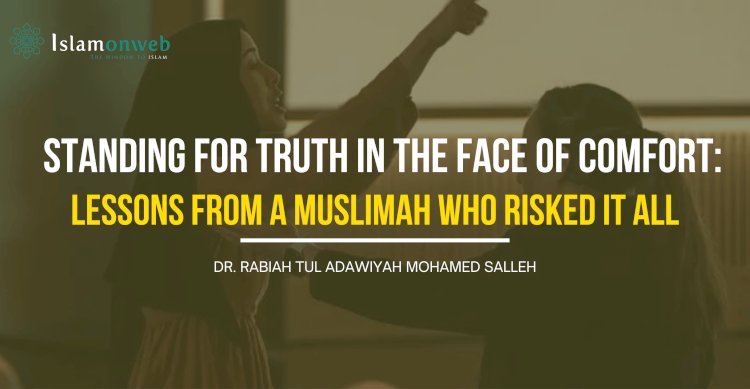




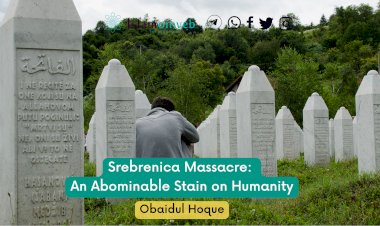
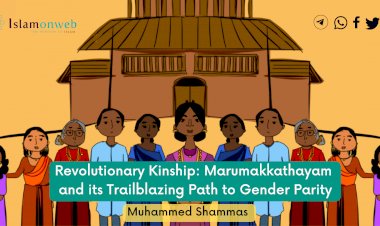
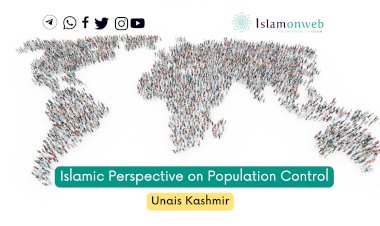
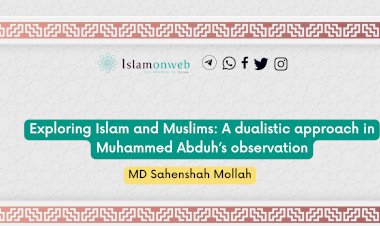














Leave A Comment